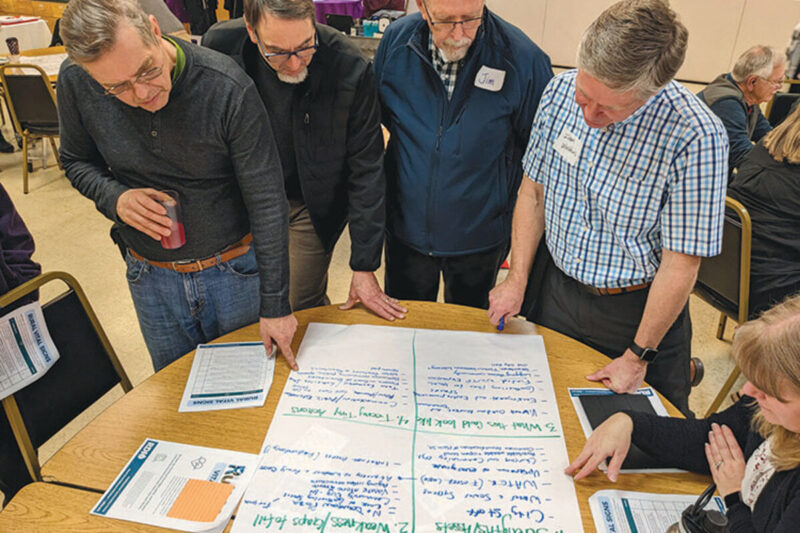Sarah Brown
Several community leaders met Monday, March 13, to discuss forming a sustainable community and youth leadership program in Sweet Home.
Among the 20-plus attendees were City Manager Kelcey Young, Library Director Megan Dazey, Police Chief Jason Ogden, Mayor Susan Coleman, Hillside Fellowship Pastor Matt Coleman, parents and other current and retired businesspeople.
The gathering resulted from work with Rural Development Initiatives, a Coburg-based nonprofit hired by the city to help adults and youth build an ongoing program to raise new leaders while working on local-interest projects.
“We are attempting to do something that’s not easy, which is to stand up a leadership development program that’s community centered,” RDI Executive Director Heidi Khokhar said. “In the past, it’s been brought in and provided for you, and at this moment in time we are trying to figure out how to make this program happen for the community, in the community, by the community.”
RDI operated the Ford Institute Leadership Program – established by the Roseburg-based Ford Family Foundation to promote vitality in rural communities – in Sweet Home for about 10 years earlier in the 21st century. Projects included Roy Johnston Park at Hawthorne Elementary School.
Now the nonprofit’s working on a self-sustaining model to be run by local leaders. To that end, RDI staff reached out to local youth and stakeholders to gauge interest in the new program.
Meeting attendees participated in activities meant to measure a city’s pulse. After perusing a list of 16 healthy community characteristics (from community pride and nature stewardship to economic building and political voice), they rated the city’s effectiveness in each area, then selected four “priorities.”
Most everyone agreed that Sweet Home was very good at stewarding its natural surroundings, and that its strengths included compassion and cooperative, can-do attitudes. Many, however, felt it lacked economy-building strength.
Areas of disagreement included emergency preparedness, building up new leaders, community-involved decision-making, a strong voice in state politics, and access to education and training. Khokhar called those areas a “creative tension” zone, an opportunity for further discussion and finding better solutions in a combined voice.
The group then examined four priority areas: building the economy, understanding the importance of quality infrastructure, financial management, and education and training. Participants analyzed each topic to determine strengths and weaknesses, consider potential improvement projects, and formulate steps to launch such projects.
This activity offered just a taste of what leadership program students would do to build leadership skills while serving their community.
“This is not leadership for leadership’s sake,” Khokhar said. “It’s about what one person might do in relation to their community. They will get community-centered leadership skills and get projects done. These are generally teeny, tiny projects that are going to lead to something bigger. If you take these classes, you are four times more involved than before, and that lasts for at least seven years.”
Jo Ann McQueary, a Ford Institute Leadership Program alumnus and Ford Community ambassador, said a sustainable leadership program in Sweet Home is necessary to create more community leaders.
“What I know about this program is that this is how it works,” she said. “This is how it has to be. It can’t be a handful of people that hold this together.”
She was referring to a point of agreement among a few fellow meeting attendees: that the same people always show up at leadership and community development projects, and that it was necessary to find others of similar mind.
Everyone brought their hopes and dreams to the table. They wanted to see the arts flourish, community projects accomplished, more participation and collaboration (including more youth participation), a stronger economic base, growth with a continued “small-town” mentality, increased tourism, services for those with mental and physical disabilities, more diversity, a larger library and more recognition of the city’s status as a “gem.”
But they also shared what they loved about their city, calling it a small-town community of helpful citizens, one with natural beauty and access to outdoor recreation.
“What I like about Sweet Home is that anybody can pick up a phone and a lint roller and make videos online,” Dazey said, referring to local resident Clint Gregg, whose “Santiam Sound” video series shares his local news reports via Facebook.
“You can reach a whole new group of people in town and get information out about what’s going on,” she said. “It’s one person literally picking up a lint roller and using it as a microphone and going out there and doing something.”
“There’s a small group of people who are doing a lot of the stuff,” Coleman said. “It’d be cool to see more people joining the team.”
Anyone interested in participating in the city leadership program is encouraged to contact Christine Gilmore at [email protected].





